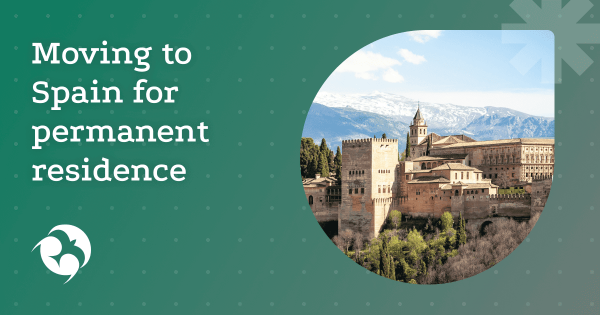Spain is a warm European country with favorable economic prospects, high–quality medicine, a relaxed lifestyle, centuries-old culture and a strong passport. In order to move to this country for permanent residence and long–term legal stay on its territory, a foreigner living in the CIS must obtain an official document – a residence permit. With a valid residence permit, you can travel across the EU without a visa, work, study, receive medical treatment, and subsequently apply for permanent residence and citizenship.
Relocation programs
Moving to Spain with the prospect of obtaining a residence permit and permanent residence is available to foreign employees with high professional qualifications, startups, investors and people with a certain level of passive income, digital nomads, university students, husbands and wives of holders of Spanish passports. A separate scheme is the legalization of stay through refugee status.
Employment
Foreign employees with whom a local company has signed an employment contract may come to Spain for a period of 3 months to 5 years. If a foreigner is going to do business or be self-employed, in order to obtain a visa and residence permit, he will need a business plan, documents on specialized education and proof of financial viability. The future entrepreneur will have to interact with the Spanish trade union of the self-employed and prove the prospects of his organization for the country’s economy.
Student visa
It is issued for 3 months to full-time students enrolled in a university with state accreditation. After entry, students change their visa to a residence permit, which is extended each year by the migration service based on a certain number of exams passed.
Full-time students looking for an additional source of income have the right to apply for a job in Spain for 30 hours a week.
Financially independent persons
This category includes recipients of passive income from abroad. At least 2,316 euros must be credited to the applicant’s bank account per month, and if relatives are traveling with him, 580 euros are added to this amount for each family member. The Migration Service will additionally check that the foreigner has savings in the amount of € 27,800. Another important condition is to live in Spain in your own property and not leave the country for more than 183 days a year. If this rule is violated, the residence permit will be revoked.
Through investments (golden visa)
To participate in this program, you must have an amount of 500,000euros or more. This money can be spent on the purchase of securities, deposited in a Spanish bank account, open a business with them, or buy real estate. The amount invested cannot be withdrawn earlier than 5 years after obtaining a residence permit, so as not to lose the status. Holders of an investor visa may not fulfill the requirement to stay in Spain for 183 days a year, i.e. permanently live abroad.
As a highly qualified employee
Such a residence permit is issued for 3 years to those who are officially employed by a Spanish company, having a certain level of education (university degree) and specialized experience (managers and IT staff – 3 years, the rest – 5 years). If a manager is traveling to the country, his salary should exceed 55,000 euros, and if a specialist is traveling – 41,000 euros. The migration authorities will check whether the host organization has any arrears in taxes and social contributions. It is worth remembering that this status in Spain is not granted to freelancers, businessmen and self–employed foreigners – only to employees with an employment contract.
On a digital nomad visa
The Digital Nomad Visa is designed for remote employees who receive at least 2,160euros per month from a foreign company. Such people have the right to stay in Spain with their relatives for 3 years, with the right to extend their status to 5 years and move to permanent residence. The documents for the digital nomad’s residence permit are submitted to the consulate and wait for their verification for 30-40 days.
On a startup visa
This relocation scheme is aimed at foreigners who want to establish an innovative business in the country. By the latter, the Spanish authorities mean, for example, projects involving AI, companies in the field of green energy or machine learning. A startup visa is granted for 3 years, extended every 2 years. To extend it, it is necessary to prove to local authorities that the business plan is being implemented and brings economic benefits. A startup visa is available to holders of €31,752 in a bank account that is not subject to EU sanctions. You can find out more about issuing a residence permit to startups in the corresponding Law No.28/2022.
Through marriage
To take advantage of the naturalization program, you must come to Spain and marry or marry a local citizen. After the wedding, the foreign husband or wife will be given a residence permit valid for 5 years. After 12 months, it is allowed to submit documents for citizenship. To maintain a residence permit, spouses must live in the country for at least 183 days a year.
Obtaining refugee status
This path is suitable for applicants who are able to document the facts of persecution in their homeland. Threats to health and life may be related to religion, membership in a particular social group, political beliefs, race or nationality.
It should be understood that refugee status implies the impossibility of returning to the country of origin. The Spanish authorities check the cases of such applicants for a long time – from six months to 24 months. In order not to take risks and not wait for a decision in fear of possible deportation, it makes sense to hire an immigration lawyer and work with him. If the response is positive, the refugee receives a residence permit from the state with the right to gradual transition to permanent residence, a salary, job placement advice, a pass to Spanish courses paid from the budget, and temporary housing.
What documents do I need to complete
In order to live in Spain for a long time, Russians receive such documents:
- TIE (tarjeta de identidad de extranjero). This is the ID card of the holder of a foreign passport who intends to legally stay in the territory of the state for more than six months. For a TIE, contact the police department at the place of residence. The state duty is 16-22€. The validity period of the TIE corresponds to the basis for issuing the residence permit.
- NIE (número de identidad del extranjero). NIE is useful for obtaining services from government agencies, paying social contributions and taxes, requesting certificates, opening bank accounts and plastic cards. After arriving in the country, they contact the Main Police Department for this number and receive it by e-mail.
- Temporary residence permit (Residencia temporary). Valid from 3 months to 5 years. To issue a document, a certificate of non-criminal record and a bank account statement are shown. The application for prolongation of the residence permit is sent online on the website.
- A permanent residence permit (Residencia de larga duración) is an indefinite Spanish residence permit that grants the right to live and work freely in the country. Permanent residence is granted after 5 years of living in Spain and an extension of the residence permit.
Transition from residence permit to permanent residence
The main condition for changing temporary residence to permanent is to live in Spain for 5 years with a residence permit. During this period, you cannot leave the state for more than 183 days per year.
To switch from a residence permit to permanent residence, foreigners apply to the immigration service and submit the following documents for verification:
- an application for each relative if the foreigner has moved with his family;
- copies of international passports;
- medical insurance;
- optional birth/marriage certificates;
- a certificate of absence of criminal record.
The foreigner will be checked for timely payment of taxes, asked to attend an interview and take an exam in Spanish.
Rights and obligations of a resident
Foreign citizens with a residence permit and permanent residence have all the same rights and benefits as passport holders. They can access:
- visa-free travel throughout the Schengen area;
- opening bank accounts;
- education;
- medical treatment;
- purchase of houses, apartments, commercial facilities;
- obtaining the rights to drive vehicles.
The foreigner will be checked for timely payment of taxes, asked to attend an interview and take an exam in the state language.
To learn more about obtaining visas and both types of residency, see the law on the rights and freedoms of foreigners in Spain and in the law on support and social integration of foreign businessmen.
Cost and standard of living
If we compare Spain with neighboring France or Germany, the cost of basic goods, services and rental housing in this country will be on average 24% lower. To cover the daily needs of one adult per month, 800 € will be needed, excluding rental housing.
Holders of a residence permit/permanent residence can be treated in public hospitals for free on an equal basis with citizens. Medical insurance in a private clinic will cost 60-180€ per person.
The tax scale in Spain is progressive, depending on the income of the resident, ranging from 19 to 50%. A separate expense item is the tax on real estate ownership: about 1% of the cost for citizens and about 0.7% for those living outside the city.
The best cities to move to
Madrid, Barcelona and Valencia are popular among the relocators in Spain.
Madrid is the capital of three million people with the most developed infrastructure in the country. There is a metro and a good railway connection, in the central and residential areas there are coworking spaces and coffee shops, where it is convenient to work with a laptop. The city is located far from the seaside, which will have to be reached by about 430 km. To rent a studio apartment located in a transport-accessible location in Madrid, you will need 1,100€ per month, excluding utilities.
Barcelona is the center of Catalonia. One and a half million local citizens and foreigners officially live there. To live here for a long time and feel comfortable, it is important to speak Spanish fluently, and preferably Catalan. In Barcelona, you can take the metro to the airport, and the Internet speed is high regardless of the area. To rent a studio apartment, you will need 1,000€ per month.
Valencia is a seaside city with affordable rental prices and an infrastructure that is not inferior to the development of Madrid and Barcelona. For example, renting a studio apartment with a convenient location will cost 800 €. Valencia is quieter than Madrid and Barcelona, with subways, dozens of museums, schools, and universities with internationally recognized degrees. There are many Russian-speaking expats in this city, including digital nomads from the CIS.
Adaptation
Spaniards are neutral towards the Slavs, they show friendliness and responsiveness, but they do not always speak English fluently. In order for a foreigner to live, work and study in the country comfortably, it is important for him to bring his Spanish to the B1-B2 level. Children with a residence permit and permanent residence are admitted to public schools free of charge, provided they have a good command of the local language.
The people of Spain really appreciate social and especially family ties, they like to get to know each other and arrange public entertainment events. Many companies and retail outlets close for an afternoon break at 2 p.m. and reopen at 5 p.m. This schedule is associated with hot weather and the characteristic Spanish habit of regularity. In this regard, the submission of documents and daily activities must be planned in advance.
Here are the communities that can be useful in Spain:
How much does it cost to move
Approximate expenses for temporary relocation to Spain for a period of 12 months:
- preparation of documents for a residence permit – 1,500-2,000€, including translation and apostille affixing;
- government fees – 80€ for a national visa, 150€ for a temporary resident’s plastic card, medical insurance – 60-180€;
- rent of a studio apartment – 750-1,100€ without utilities, depending on the chosen city.
- The cost of groceries, mobile communications and other household needs is 800€ per person.












